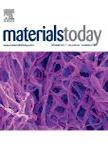版权所有:内蒙古大学图书馆 技术提供:维普资讯• 智图
内蒙古自治区呼和浩特市赛罕区大学西街235号 邮编: 010021

作者机构:Univ Macau Inst Chinese Med Sci State Key Lab Qual Res Chinese Med Macau Peoples R China Sun Yat Sen Univ Sch Pharmaceut Sci Guangzhou 510006 Guangdong Peoples R China Univ Nebraska Med Ctr Dept Pharmaceut Sci Omaha NE 68198 USA
出 版 物:《MATERIALS TODAY》 (当今材料)
年 卷 期:2019年第25卷
页 面:66-87页
核心收录:
学科分类:08[工学] 0805[工学-材料科学与工程(可授工学、理学学位)] 080502[工学-材料学]
基 金:Macao Science and Technology Development Fund [096/2015/A3] Research Fund of the University of Macau [MYRG2016-00130-ICMS-QRCM, MYRG2017-00182-ICMS]
主 题:Chinese medicine Medicine ACTIVE INGREDIENTS Hepatocellular Cancer targeting Antineoplastic Agents Human-centered computing Obstetric Delivery
摘 要:Active ingredients from Chinese medicine (AIFCM) are emerging as a class of anticancer agents for treating hepatocellular carcinoma (HCC). AIFCM have unique advantages over traditional chemotherapeutic drugs, such as their multi-target, multi-level, and coordinated intervention effects against HCC. Recent researches demonstrated their potentials in inhibiting HCC initiation, cell proliferation, angiogenesis, and metastasis. With the advantages of nano-carriers including better bioavailability, significant features of passive or active targeting and stimulus-responsive drug release. Formulation of AIFCM and nano-carriers shows great potential in promoting anti-HCC therapeutic development. Here, we critically assess nano-carriers for delivery and targeting of AIFCM for HCC therapy. First, we offer an overview of major pathogenic factors to induce HCC, including virus infection, alcoholic liver disease, mycotoxin, obesity, and type 2 diabetes. Second, the mechanisms of AIFCM for HCC therapy comprising gene regulation and transduction of different molecular pathways are discussed. Third, significant achievements of AIFCM-encapsulated nano-carriers and AIFCM-modified nano-carriers against HCC are presented. Finally, we provide concluding remarks and future perspectives of AIFCM for HCC therapy, hoping to offer some insight on how to improve AIFCM-based HCC therapy.